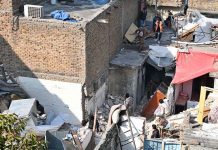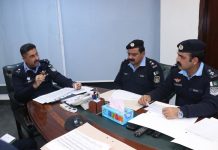By Ali Imran
ISLAMABAD: Special Assistant to the Prime Minister on Poverty Alleviation and Social Protection, Dr. Sania Nishtar Thursday emphasized that transforming our food systems should be central to our efforts for achieving Sustainable Development Goals by 2030.
Dr. Nishtar was keynoting the two high-level international events hosted by the Inter-Parliamentary Union (IPU) and World Food Programme (WFP). Dr. Nishtar presented Pakistan’s perspective on nutrition centred social protection operations and said, “Nutrition is embedded in the Ehsaas strategy post- COVID. The pandemic has shown that it is possible to place nutrition at the heart of poverty alleviation objectives†.
She further accentuated that Ehsaas aims to promote equalities, which amongst other things centers on human capital development, of which healthy diet is a core component. Nutrition, therefore, is very important part of Ehsaas framework and the programme looks at it holistically.
The theme of IPU’s high-level parliamentary meeting was “Transforming food systems for health, equity, and sustainability†. Alongside Dr. Nishtar, other eminent speakers were- Gerda Verburg, UN Assistant Secretary-General and SUN Movement Coordinator; Agnes Kalibata, UN Secretary-General’s Special Envoy to the 2021 UN Food Systems Summit; QU Dongyu, Director-General, FAO.
The meeting identified entry points for parliamentary action to ensure the production, processing, distribution and consumption of food responds to health, equity and sustainability imperatives.
The outcomes of the meeting informed the preparatory process of the UN Food Systems Summit. The IPU is the global organization of national parliaments, with 179 Member Parliaments out of the 193 countries in the world. Earlier, World Food Programmes (WFP) hosted a side event for Executive Board members and partners that talked about WFP’s support to national social protection, as a way of reaching Zero Hunger.
A number of partners were invited to speak about their perspectives on WFP’s work including Germany’s BMZ, Sweden’s Sida, and the World Bank.
From Pakistan, Dr. Sania Nishtar highlighted the central role of Ehsaas in tackling nutrition. Outlining Ehsaas’ social protection role in post-COVID context, Dr. Nishtar shared that Ehsaas Nashonuma is a conditional cash transfer program aimed at tackling stunting among children under two years of age, along with pregnant and lactating mothers.
In the first phase, 50 Ehsaas Nashonuma Centers have been opened across 14 most stunted districts of Pakistan. Also, predicated on the improved nutrition outcomes of poor families, National poverty graduation initiative of Ehsaas has an emphasis on asset transfers of goats and chicken and a kitchen gardening initiative to help low-income families to supplement vegetables and fruits intake.




